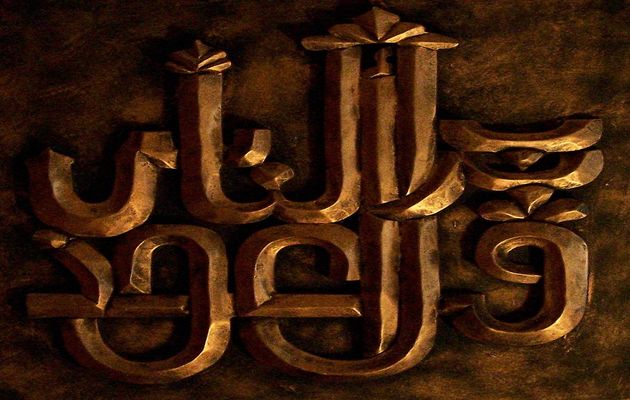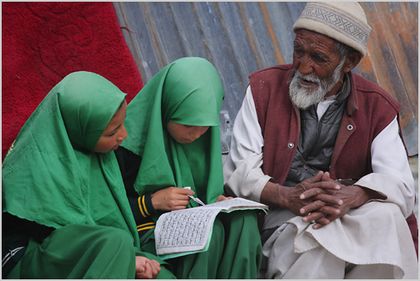The Hadith reports can take Muslims in many directions: to compassion for widows and orphans, to patriarchal attitudes towards women, to disdain for religious minorities, and to military jihad for the cause of Islam.
 Photo: Ahmad Tarek
Photo: Ahmad Tarek
Stereotyping the world of Islam is a fruitless task; such is its internal diversity.
Nowadays sectarian conflict is tearing apart Muslim populations in the Middle East, Africa, and Asia. While some Muslims pursue a vision of a forward-thinking, rationalist faith, others look backwards to what they see as a pristine age when Muhammad established the first Islamic community in Medina.[1]
For the latter group, the Hadith, or prophetic traditions, are crucial in realising their vision, enabling Muslims who want to model their lives on that of their prophet to do so. These traditions record tens of thousands of short reports about Muhammad’s actions, attitudes, concerns, preferences, and prejudices.
Read literally, the Hadith reports can take Muslims in many directions: to compassion for widows and orphans, to patriarchal attitudes towards women, to disdain for religious minorities, and to military jihad for the cause of Islam.
Some Muslim groups are re-engaging with the Hadith collections, recognising that much Hadith content points more towards social circumstances from past centuries than present and future requirements of diverse societies. They are seeking to select from these prophetic traditions in ways which complement rather than contradict 21st century values.
Turkish Hadith project
In mid-2013, the Turkish Ministry of Religious Affairs, or the Diyanet, published a new selection of Hadith accounts. Entitled Islam with the Hadith of the Prophet, their appearance represented the culmination of a controversial gestation period lasting almost a decade.
In 2004, the then Turkish Minister of Religious Affairs, Mehmet Aydin, put forward the proposal to produce this new Hadith collection. This project received the direct support and sponsorship of the Justice and Development Party (AKP) government led by Prime Minister Recep Tayyip Erdogan, who was investing significant resources in reviving the Islamic identity of the secular Turkish Republic.
The terms of reference of this project were stated clearly by the project leader of the time, Mehmet Gormez, himself a scholar of Hadith studies, who explained: ‘The project takes its inspiration from the interpretations of the modernist vein of Islam . . . We want to bring out the positive side of Islam that promotes personal honour, human rights, justice, morality, women’s rights, respect for the other.’[2]
A team of over 80 scholars was assembled for the task, and responsibility was given to the Faculty of Divinity of the University of Ankara. Work started in earnest in 2006, but within 18 months, news of this project had spread beyond Turkey, triggering considerable controversy.
In 2008 BBC Religious Affairs Correspondent Robert Pigott wrote: ‘Turkey is preparing to publish a document that represents a revolutionary reinterpretation of Islam—and a controversial and radical modernisation of the religion.’[3] Other Western news agencies followed suit, presenting the project in ways that reflected an underlying yearning in the West to witness an Islamic reformation.
Gormez, who was himself involved in doing some of the writing for the first volume, sought to insert a measure of reality into the discussion by commenting in one interview:
‘[The Western media] made too much fuss and took the project out of its real context. We are neither fashioning a new Islam nor dare to alter the fixed maxims of Islam. The Western media have read what [we] are doing from a Christian perspective and understood it in line with their Christian and Western cultures . . . No Muslim in their right mind would dare delete any Hadith or tamper with the Prophet’s heritage.’[4]
After the dust settled from this media flurry, the project team at the University of Ankara proceeded with their tasks. There were multiple challenges. First, some conservative Muslim voices had been alerted to this project by the media discussion and were closely watching developments. One Arab scholar was quoted as confronting a Turkish academic and saying in anger: ‘Will you write a new Qur’an next?’[5]
Furthermore, the task of selecting a few hundred Hadith accounts from the tens of thousands available represented a significant challenge. The problem was not simply a matter of wading through detail. Quite simply, many Hadith reports do quote Muhammad as expressing views which are antithetical to 21st century pluralistic attitudes:
The project is realized
When the collection Islam with the Hadith of the Prophet was released by the Diyanet in Ramadan 2013, it aroused considerable interest. It appeared as a seven-volume encyclopaedia, drawing from almost 20 authoritative Hadith collections and presenting its several hundred Hadith reports grouped according to around 350 themes. Unlike the standard collections by Al-Bukhari and other great traditionalists which simply list the Hadith reports without commentary, this new Turkish collection presents the Hadith themes within the context of short accompanying essays, providing historical context and placing particular emphasis on their relevance for the 21st century.
 Photo: Nevil Zaveri
Photo: Nevil Zaveri Particular attention is placed within this collection on shaping reader attitudes on issues of great currency today, such as women’s rights, the environment, and other contemporary topics. A number of Hadith reports are assembled around the theme of education, with the first report being that which states: ‘seeking knowledge is obligatory for every Muslim’. After presenting several other related Hadith reports, commentary is presented which emphasises that ‘every Muslim’ includes women as well. In this way, the collection subtly undermines Hadith-minded literalist groups such as the Pakistani and Afghan Taliban that destroy women’s schools and restrict women to the home, citing support for their narrow views from certain Hadith reports.
The Diyanet is determined to maximize the influence of the new collection. It has been circulated throughout Turkey to government-appointed imams. Moreover, the collection has been translated into various languages, including Albanian, Azerbaijani, and Bosnian, with other translations underway into Chinese and various European languages.
However, its influence at the level of the Turkish masses is uncertain. In the words of one Turkish academic: ‘It is really difficult to say. Turkish people do not read a lot, especially voluminous books. I have also not come across serious reviews or critical evaluations of it in academic circles.’[7] Likewise, time will be needed to enable a serious assessment of the impact of its other language versions.
Other Muslims question the Hadith
Scepticism about the standard Hadith collections and their relevance for the 21st century can be seen elsewhere in the Islamic world:
Some Islamic groups go further and declare themselves to be ‘Qur’an-only’ Muslims, arguing that the Hadith should not be considered as Islamic sacred literature at all. Such anti-Hadith groups can be found in Malaysia and Pakistan—keeping a very low profile in sensitive times—as well as in the West. Such groups maintain a visible online presence but their writings attract very prompt rebuttals from more orthodox Muslim groups which affirm the central role of the Hadith collections as part of the Islamic sacred literary corpus.[9]
Reflections for Christians
How should non-Muslims, especially Christians, react to such Muslim reviews of the Hadith? The first essential step is to see the Turkish project as a part of the ongoing struggle for identity within the world of Islam, a struggle fought between those who would wish to impose a scripturally literalist brand of their faith on the masses and their opponents who wish to redefine Islam as a modern, rationalist, non-extremist faith. The latter group wishes clearly to maintain the essential elements of Islam, but to express them within a 21st century framework.
However, there is another angle that Christians need to consider. Many Christian scholars of Islam contend that today’s multiple manifestations of Islamic radicalism are deeply rooted in the texts of Islam, rather than being mere reactions to modern-day grievances. I have long argued this case myself. For those of this opinion, this Turkish initiative should be seen as one manifestation of something that we have long awaited: an examination by Muslims of their sacred texts to eliminate elements ill-suited to the modern world—violence, social discrimination, hostility towards non-Muslims, and so forth.
This Turkish Hadith Project is not going to turn the world of Islam upside down overnight. However, it may well prove to be a small but valuable step on a long journey towards a genuinely critical examination of taboo subjects that cry out for detailed scrutiny: the historicity of the sacred texts and the life of Muhammad.
Endnotes
[1] Editor’s Note: See article entitled ‘The Challenge of Radical Islam’ by John Azumah in the March 2015 issue of Lausanne Global Analysis, and article entitled ‘The UK Campaign to End Religious Illiteracy’ by Jenny Taylor in the January 2015 issue of Lausanne Global Analysis.
[2] http://www.danielpipes.org/5554/is-turkeys-government-starting-a-muslim-reformation
[3] http://news.bbc.co.uk/2/hi/europe/7264903.stm
[4] https://books.google.com.au/books?id=gm6TyAANfM8C&printsec=frontcover&cd=1&source=gbs_ViewAPI&output=embed&allissues=1&redir_esc=y
[5] http://www.huffingtonpost.com/2013/05/22/turkey-hadith-project-diyanet-presents-prophets-sayings-for-the-21st-century_n_3319657.html
[6] http://www.futureislam.com/inner.php?id=Mjcw
[7] Personal correspondence.
[8] http://www.futureislam.com/inner.php?id=Mjcw
[9] For an example of anti-Hadith critique, see http://www.masjidtucson.org/publications/books/sp/1986/aug/page1.html. For an online rebuttal of anti-Hadith writings, see http://fighting-anti-sunnah.blogspot.com.au/2012/11/introduction-to-anti-hadith-or-anti.html.
Peter Riddell is Vice Principal Academic at Melbourne School of Theology and Professorial Research Associate in History at SOAS, the University of London (School of Oriental and Asian Studies). His research focuses on Southeast Asian Islamic history and theological texts, with particular reference to interpretation of the Qur’an.
This article originally appeared in the July 2016 issue of the Lausanne Global Analysis and is published here with permission as part of the LGA Media Partnership. Learn more about this flagship publication from the Lausanne Movement here.

Las opiniones vertidas por nuestros colaboradores se realizan a nivel personal, pudiendo coincidir o no con la postura de la dirección de Protestante Digital.
Si quieres comentar o